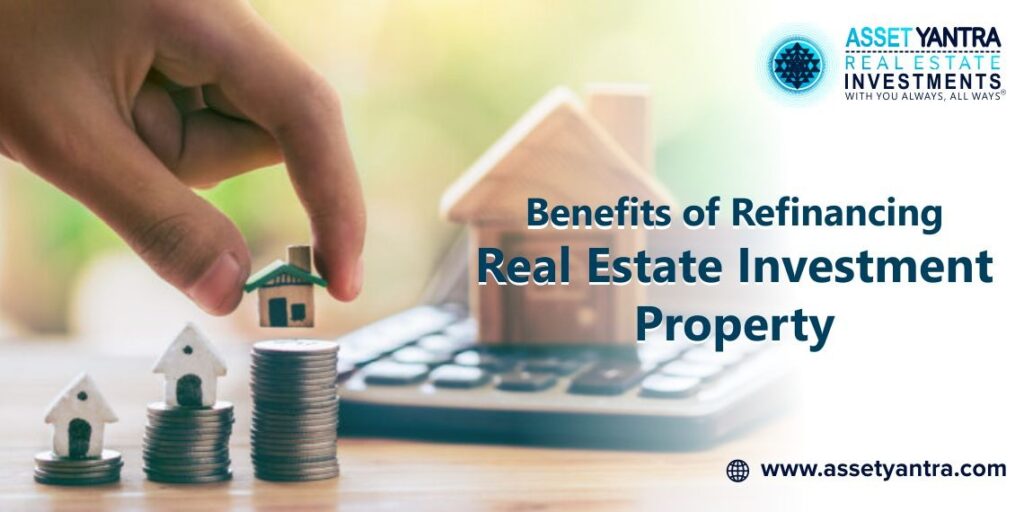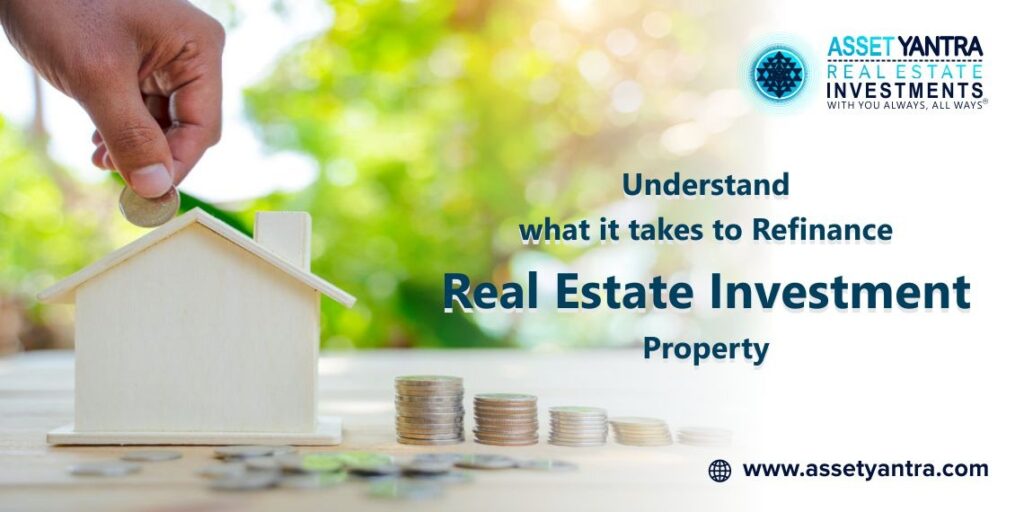When you own an investment property, the ultimate goal is to earn a substantial rate of return. If you find your return after several years of ownership is not what you expected. You may probably decide to refinance real estate investment property.
Refinancing a property can be a very beneficial investment strategy especially, for a property investor. Therefore, whether you own half a dozen rental properties of you’re a first-time real estate investor. It’s essential to understand what it takes while refinancing an investment property.
There are several steps you should consider before qualifying for a refinance. In this article, you will learn as an investor on how to comprehend the purpose of refinancing and how to weigh the risks versus rewards.
When do you need to refinance your Investment Property?
Lower Monthly Mortgage Payment
One of the main reasons investors intend to refinance their properties is to lower the interest rate on the loan interest. The satisfaction of this, the monthly mortgage payments will be reduced. Leaving you with more money in your pocket each month. This money that you saved can be used or invested somewhere else.
Purchase New Investment Properties
Another reason for refinancing is taking out the Equity in your investment property to buy additional properties. It allows you to use the money to fund other investment opportunities or upgrade a current investment property with the changing pace.
Pay off Your Loan Faster
By refinancing the current capital. An investor can pay off the loan at a faster rate. Thereby enabling the investors to get a loan with better terms. An investor can also negotiate a mortgage with less money down or a loan with a longer or shorter term. Depending on their needs through refinancing.
How can you refinance your Investment Property?
Determine how much Equity you have
Before learning how to refinance a property, you need to know how much property you have already managed to build up. As per facts, developers or any financial institutions typically require a cushion of 25% or more to refinance a loan secured by a non-owner-occupied house.
Determine the Value of the Property you owned
Determining the value of the investments is crucial for a qualified refinancing. It helps investors to get on with better terms. You can determine the value of the property by either:
Referring to online, for instance, if you own any commonly traded investment, such as a condo, single-family, etc., You can refer to the reputed sites online for conducting a search in the area for the determination of the value of the property.
You can also seek a broker’s opinion; if you own an investment that is difficult for the self-appraisal, such mixed-use property. You can contact a local realtor and seek the broker’s price opinion.
Acquaint yourself with the Mortgage Rules
Acquainting yourself with the mortgage rules can help in negotiation and deciding on the loan terms. Knowing the loan-to-value ratio (LTV) can help while refinancing. It is the mortgage amount divided by the appraised value of the property. Showing developers or the financial institutions how much Equity you own.
Once you set the property’s value, you can compare it to the current mortgage rate to determine the general LTV range. On calculating, if you find the value of the property ranges between 50% and 80%. You can proceed to the further steps for refinancing.
Choosing the Right Financial Institutions or Any Real Estate Platforms
For this, you need to reach out to any financial institutions or real estate agents and request quotes. Different developers or financial institutions have different requirements and terms for the investments, making it necessary to shop around. You need to get at least three quotes from different developers or the funding institutions.
You will also need to request rates for at least 15 or 30 years on either a fixed mortgage or adjustable-rate mortgages. In addition to the rates, you need to review the aspects like the length of the ownership, closing costs, credit score, and timeframe for receiving the loan, etc.
Regarding this, an investor will be required to showcase some of the documents about refinancing an asset. Such types of propositions include proof of personal and rental income, proof of assets owned, proof of any individual ownership, references relating to any debts and obligations, and a copy of the property appraisal if any.
Do the Break-Even Calculation
Before refinancing any property, you should calculate and analyze the break-even point of the transaction. It would help if you were sure that the investment property refinances rates are lower than the purchase cost of the asset being made initially.
For calculating the break-even point, you need to consider all the upfront costs of the refinancing loan with any closing costs plus any other costs and estimate how much you can save each month. Comparing, you can determine how much time you will take before you reach break-even and begin to save money.
Refinancing
After receiving several quotes, it’s time to choose the suitable financial institutions or the right estate platforms for refinancing your investment properties. However, these financial institutions may further process some of the documents relevant while loan sanctioning and might include statements about tax returns, financial statements, mortgage statements, etc., for loan approval.
Pass of Loan Approval
Once you’ve done with the process of applying, the financial institutions or any other developers where you have applied will review the loan application, thereby passing the order for the appraisal of your investments, if satisfied. Also, if the finances look good and your investment properties appraise, you can schedule a closing loan, at last.
Benefits of Refinancing Real Estate Investment Property

Changing the type of interest
Refinancing and investment is highly advantageous for an investor. It allows investors to switch from a variable interest rate to a fixed rate of interest.
As seen, Interest able interest rate is usually a rate on a loan in which the interest charged on interest balance fluctuates with the market throughout the life of the loan.
However, having a fixed interest rate on is highly advantageous. As the rate to be charged remains fixed for the loan’s entire term, no matter what the interest rate prevails in the market.
Changing the Loan-Term
Refinancing can also help investors change the length of the loan-term to which they are committed for payments.
Estimation of the Loan-to-Value Ratio
Refinancing can help investors exhibit the loan-to-value-ratio (LTV), as knowing (LTV) can help while refinancing. This is because LTV is the mortgage amount divided by the properties appraised value, which shows the developers or the financial institutions how much Equity you own.
Refinancing at Right Time
Refinancing an investment property at the right time can lower the amount an investor owes in interest over the interest loan.
The Bottom Line
Though refinancing is beneficial, yet before refinancing your investment property, you need to identify whether the idea behind your decision makes any sense. For instance, if you plan to keep the property for a few more years, it would not be a right and safe choice.
While refinancing, you need to address the various relevant aspects for an ideal refinancing. Such aspects include meeting the asset cost, credit, debt cost, or other accrual income. It’s advisable to read as much as resources available for making any new investments and gather multiple quotes to find the best loan scheme.
Takeaway
Want to own a high-yielding Real Estate asset without the hassle of ownership? Then, checkout Asset Yantra & Gak Group, an online crowdfunding platform offering the best investment opportunities with an expected IRR of about 21% and a good capital appreciation.
Refinance Real Estate Investment Property FAQs
One good reason for refinancing is the ability to take out the Equity in your investment property to buy additional properties. It allows you to use the money to fund other investment opportunities or upgrade a current investment property with the changing pace.
Refinancing an investment property at the right time can lower the amount an investor owes in interest over the interest loan.
You can determine the value of the property by either:
Referring to online, for instance, if you own any commonly traded investment, such as a condo, single-family, etc., you can refer to the reputed sited online for conducting a search in the area for the determination of the value of the property.
Or can also seek a broker’s opinion. If you own an investment that is difficult for the self-appraisal, such as mixed use property, you can contact a local realtor and seek the broker’s price opinion. This can help you in the proper estimation of the ballpark value of the property.
Before refinancing any property, you should calculate and analyze the break-even point of the transaction. It would be best if you were sure that the investment property refinances rates are lower than the purchase cost of the asset being made initially.
For calculating the break-even point, you need to consider all the upfront costs of the refinancing loan with any closing costs plus any other costs and estimate how much you can save each month. Comparing, you can determine how much time you will take before you reach break-even and begin to save money.

